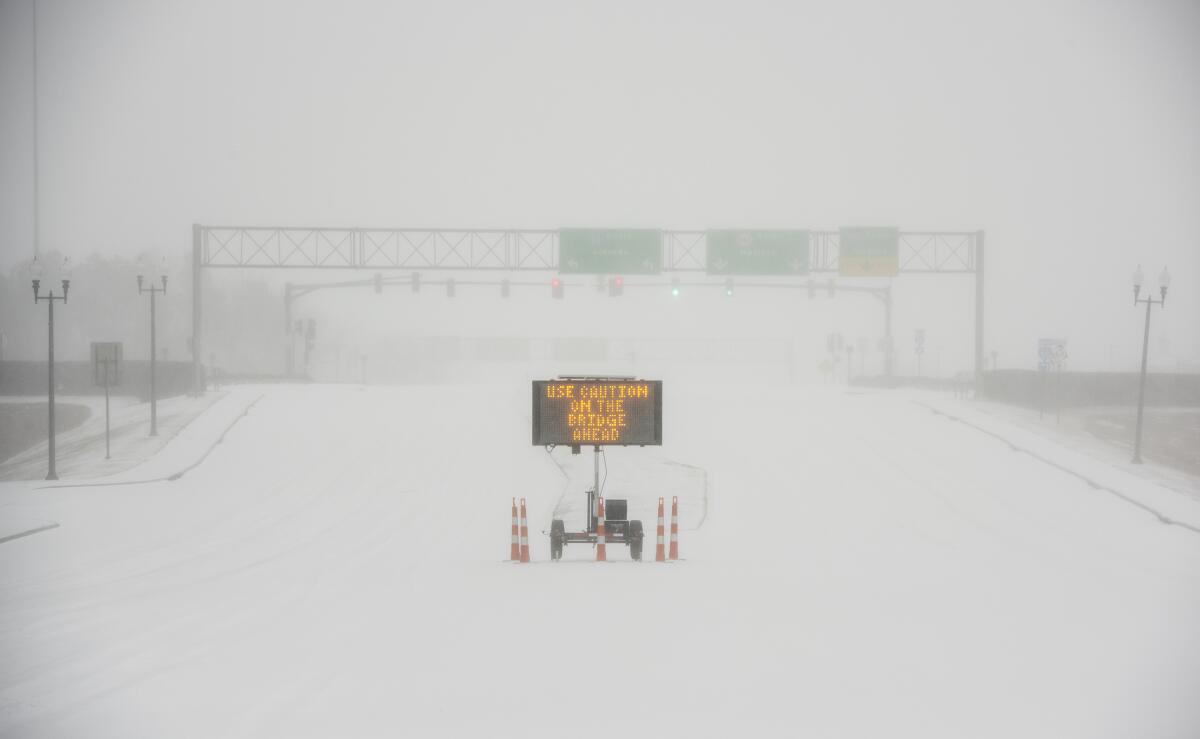Op-Ed: Why Jackson, Miss., reminds me of Flint, Mich.

Some residents of Jackson, Miss., have not been able to flush their toilets until this week, nearly month after two winter storms hit the region in mid-February.
Coming into the year, the state’s branch of the American Society of Civil Engineers had already handed Mississippi a D+ for its infrastructure, so it was no surprise that basic systems failed in the weather catastrophe.
Some services are slowly returning, but thousands are still on a “boil water” advisory with no proposed timeline as to when it will be lifted. Last week Mayor Chokwe Antar Lumumba sent an email to Gov. Tate Reeves requesting $47 million in emergency state and federal funding to address the immediate needs of its water treatment system. He estimates the city needs $2 billion to update an infrastructure that includes water pipes that are more than 100 years old.
The City Council voted to seek legislative approval to raise its local sales tax by one penny, but Reeves, who needs to approve such an election, said, “I do think it’s really important that the city of Jackson start collecting their water bill payments before they start going and asking everyone else to pony up more money.”
I wish this callous and disingenuous response — as if the state’s D+ grade for infrastructure is a result of missed water payments during a global pandemic — were shocking. But after the country witnessed years of criminal neglect surrounding the water crisis in Flint, Mich. — in a state that likewise received a D+ on the state of its infrastructure in 2018 — we know better.
Before shaking your head at those states, know that California’s C- infrastructure grade is not that much better. Nearly a third of the main water pipelines in Los Angeles were installed before 1938.
The difference with Mississippi’s state government is that it seems to treat its major cities like financial parasites.
As the Biden administration takes a victory lap for the $1.9-trillion relief package, the focus now shifts to an estimated $2-trillion clean infrastructure proposal. In addition to Jackson and Flint, what happened in Texas last month proved that kicking replacement and repairs down the road is no solution.
The association of civil engineers estimates that nationwide a water main breaks every two minutes and 178 million trips are made on structurally deficient bridges every day.
In short, the country needs to aggressively address its infrastructure issues before city shutdowns accompanied by loss of life — as witnessed in Texas — become more frequent.
However, it is imperative that the Biden administration not leave the distribution of funds in the hands of state officials like Reeves.
The situation in Jackson, where 82% of the residents are Black, is a microcosm of the larger systemic issue of white Republican state officials second-guessing Black Democratic municipal leadership. They will point to statistics — say, the number of underperforming schools — without acknowledging the lasting impact white flight has on a city’s revenue or that capital funding for public schools around the country was down 31% in fiscal year 2017 compared with 2008, even as public schools disproportionately serve children of color.
In vilifying the leadership in places like Oakland, Baltimore and my hometown of Detroit, they gloss over the lasting impact of government-sanctioned red-lining, courtesy of the federal housing authorities. Decades and decades of white residents being able to build equity while denying Black residents the same opportunities.
Republican county and state officials were no longer interested in maintaining the infrastructure in urban Democratic hubs, instead focusing on largely white suburbs, with Republican voters. And when buildings, bridges, roads and water pipelines began failing in urban centers, these officials have the nerve to blame Black leadership instead of ancient infrastructure coupled with decades of neglect driven by racism toward the people living in the urban centers.
“There always seems to be this point of distrust when it comes to the city,” said Mississippi state Rep. Ronnie Crudup Jr., who represents part of Jackson. “There’s always been this thought that the city can’t manage certain funds. There may have been some mismanagement of some resources in the past, but the city has done a decent job of trying to take care of our normal everyday needs.”
Now. obviously some of the current infrastructure issues major cities face are self-inflicted. But the true root of the country’s problem is no surprise — Congress’ refusal to invest what’s needed in just about every community in this country. No one wants to hand political foes a victory, so everyone loses. Infrastructure should not be a partisan issue — but it is.
It should not be a racial issue either— but like most things in this country, it most certainly is. This is why whatever President Biden proposes needs to be accompanied by federal-level oversight. Leaving it to the states — like Mississippi — will leave its major cities in the cold.
Just look at comments by Lt. Gov. Delbert Hosemann, who offered little sympathy for the majority of Jackson residents suffering from the water disaster. He pointed to former Mayor Kane Ditto as having addressed the city’s crumbling infrastructure two decades ago.
“So what happened since then?” Hosemann asked archly.
Ditto was the city’s last white mayor. I’m sure that’s just a coincidence.
@LZGranderson
More to Read
A cure for the common opinion
Get thought-provoking perspectives with our weekly newsletter.
You may occasionally receive promotional content from the Los Angeles Times.











